This article was medically reviewed by R. Sonia Batra, MD, MSc, MPH. Dr. R. Sonia Batra is a board certified Dermatologist and the Founder of Batra Dermatology based in Los Angeles, California. With over 15 years of experience, Dr. Batra specializes in lasers, medical devices, patient and public medical education, and skin cancer research. She received her Bachelor’s degree, Master’s degree in Public Health, and her Doctor of Medicine (MD) degrees from Harvard University. As a Rhodes Scholar, she earned a Master’s degree in Molecular Genetics at the University of Oxford. She completed her residency training in Dermatology at Stanford University. Dr. Batra has contributed and reviewed for the Journal of Dermatologic Surgery, the Journal of the American Academy of Dermatology, and JAMA Dermatology. She is also a co-host of CBS’ Emmy award-winning television show, The Doctors.
There are 14 references cited in this article, which can be found at the bottom of the page.
This article has been viewed 52,349 times.
While there are no miracle cures when it comes to healing scars fast, there are a variety of treatments you can try. Although not all might work for you, some might. By using prescription and over the counter products, trying homeopathic remedies, and taking steps so the scar doesn’t get worse, you may have success getting your scars to heal quickly.
Steps
Healing Scars with Medical Applications
-
1Apply silicone gel sheets. Silicone gel sheets have been shown to be very effective in healing scars quickly. These can be purchased over-the-counter from a local pharmacy. Follow the instructions on the box to apply them to your scar.[1] [2]
- In most cases, silicone gel sheets should be left on the site of the scar for 12 hours or more. You’ll have to reapply another sheet the following day.
- Healing time will vary from person to person. You may see your scar reduced in days, weeks, or months.[3]
-
2Use Vaseline. Vaseline (petroleum jelly) has the effect of moisturizing skin and scars. Moisture on skin will increase skin growth and regeneration. This may, in some circumstances, decrease the appearance of scars and help them heal quickly.[4]Advertisement
-
3Put sunscreen on the scar. By applying sunscreen, you’ll help reduce the chance of red or brown discoloration occurring around the cut or scar.[5] In addition, sunscreen will protect the skin, keep it moist and promote new skin growth.
-
4Use corticosteroid injections. Talk to your doctor about getting corticosteroid injections. By injecting corticosteroids into the site of a scar, you may be able to heal it or reduce its appearance.[8]
- Steroids undermine the bonds of collagen fibers in your skin, which will help break down scar tissue. Once the scar tissue is broken down, new skin will grow in its place.[9]
-
5
Limiting Things That Make Scars Worse
-
1Avoid using Vitamin E. While many people believe that Vitamin E helps scars, it can actually cause rashes or irritation. To be safe, don't put Vitamin E oil, gel, or capsules on your scar.[12]
-
2
-
3Cover your cut. Many people recommend allowing a cut or scar to “breathe.” Unfortunately, this has the impact of inhibiting cell growth. Instead, cover your cut and keep it moist with aloe vera or something similar.[15]
- Use an adhesive bandage or gauze to cover the cut or scar.
-
4Avoid frequent sun exposure. Whenever a wound or scar is healing, you should stay out of the sun. Sun exposure could undermine the ability of the skin to heal correctly. It could make the scar worse. As a result, if you must go outside, make sure to wear a wide-brimmed hat, long clothes, and sunscreen.[16] [17]
How Can I Reduce The Appearance Of Injury Scars?
References
- ↑ R. Sonia Batra, MD, MSc, MPH. Board Certified Dermatologist. Expert Interview. 14 May 2021.
- ↑ https://www.nhs.uk/conditions/scars/treatment/
- ↑ https://uihc.org/health-topics/caring-your-burn-after-hospitalization
- ↑ https://www.aad.org/public/everyday-care/injured-skin/burns/wound-care-minimize-scars
- ↑ R. Sonia Batra, MD, MSc, MPH. Board Certified Dermatologist. Expert Interview. 14 May 2021.
- ↑ https://www.aad.org/public/everyday-care/injured-skin/burns/wound-care-minimize-scars
- ↑ https://www.aad.org/public/skin-hair-nails/injured-skin/wound-care
- ↑ https://www.hopkinsmedicine.org/health/conditions-and-diseases/scars
- ↑ http://nyulangone.org/conditions/scars-keloids/treatments/medical-treatment-for-scars-keloids
- ↑ https://pubmed.ncbi.nlm.nih.gov/25003428/
- ↑ https://www.ncbi.nlm.nih.gov/pmc/articles/PMC6330525/
- ↑ https://www.ncbi.nlm.nih.gov/pmc/articles/PMC1781083/
- ↑ https://my.clevelandclinic.org/health/diseases/21466-hypertrophic-scar
- ↑ https://www.aafp.org/pubs/afp/issues/2000/1101/p2029.html
- ↑ https://www.healthychildren.org/English/health-issues/injuries-emergencies/Pages/Treating-Cuts.aspx
- ↑ R. Sonia Batra, MD, MSc, MPH. Board Certified Dermatologist. Expert Interview. 14 May 2021.
- ↑ https://msktc.org/burn/factsheets/Scar-Management
About This Article
Although there are no miracle cures when it comes to healing your scars, there are a few things you can do to help your skin recover. Apply a thin layer of aloe vera or Vaseline to your scar up to 3 times a day to hydrate your skin and help it heal. Cover your scar with an adhesive bandage after applying aloe vera or Vaseline, which will keep your scar moist and promote cell growth. Alternatively, cover your scar with a silicon gel sheet and change it every day. Try to avoid going out in the sun while your scar is healing since sun exposure can actually make a scar worse. If you do go outside, always apply sunscreen with at least SPF 30 to your scar. This will protect your skin from discoloration. If your scar doesn’t look any better after a few months, talk to your doctor about corticosteroid injections, which can help your skin heal quicker. For more tips from our Medical co-author, including how to safely clean a wound, read on!
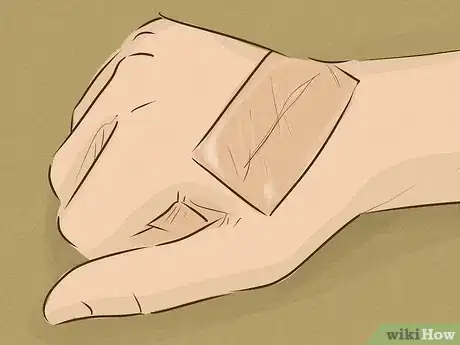

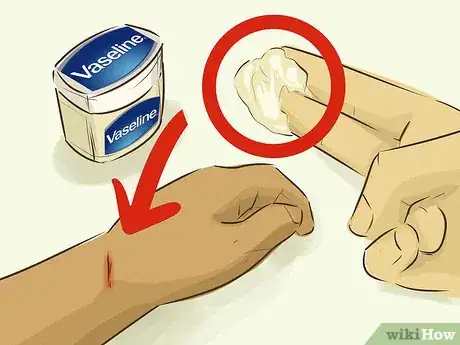
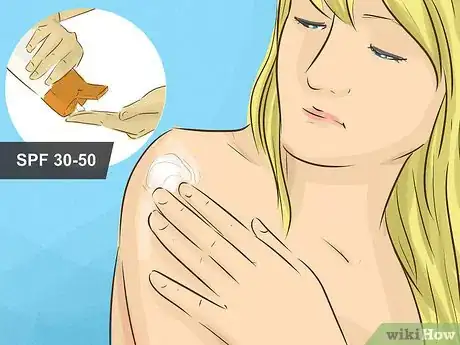
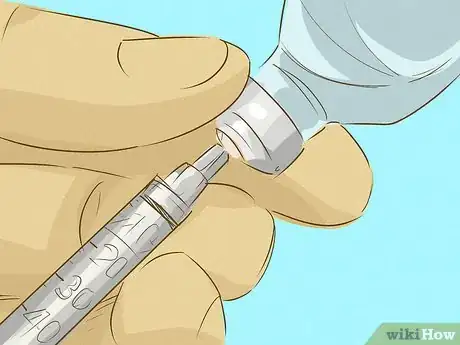
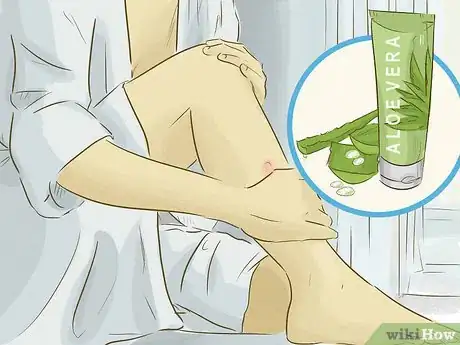


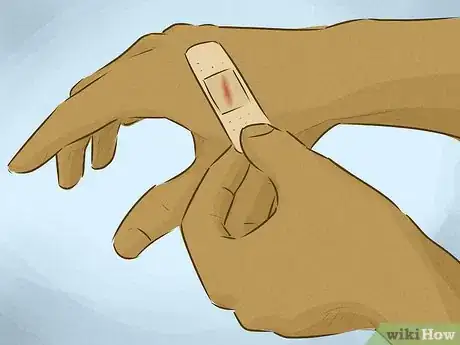



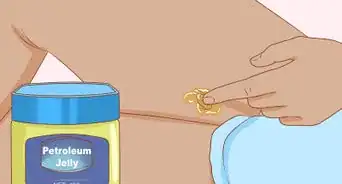
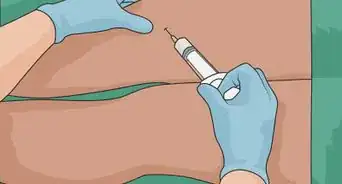


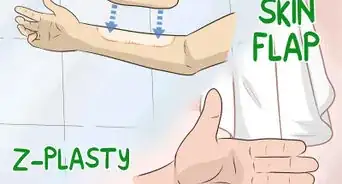
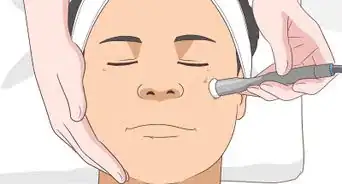


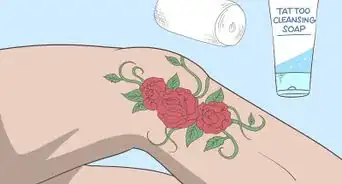









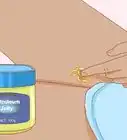
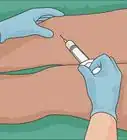



































Medical Disclaimer
The content of this article is not intended to be a substitute for professional medical advice, examination, diagnosis, or treatment. You should always contact your doctor or other qualified healthcare professional before starting, changing, or stopping any kind of health treatment.
Read More...